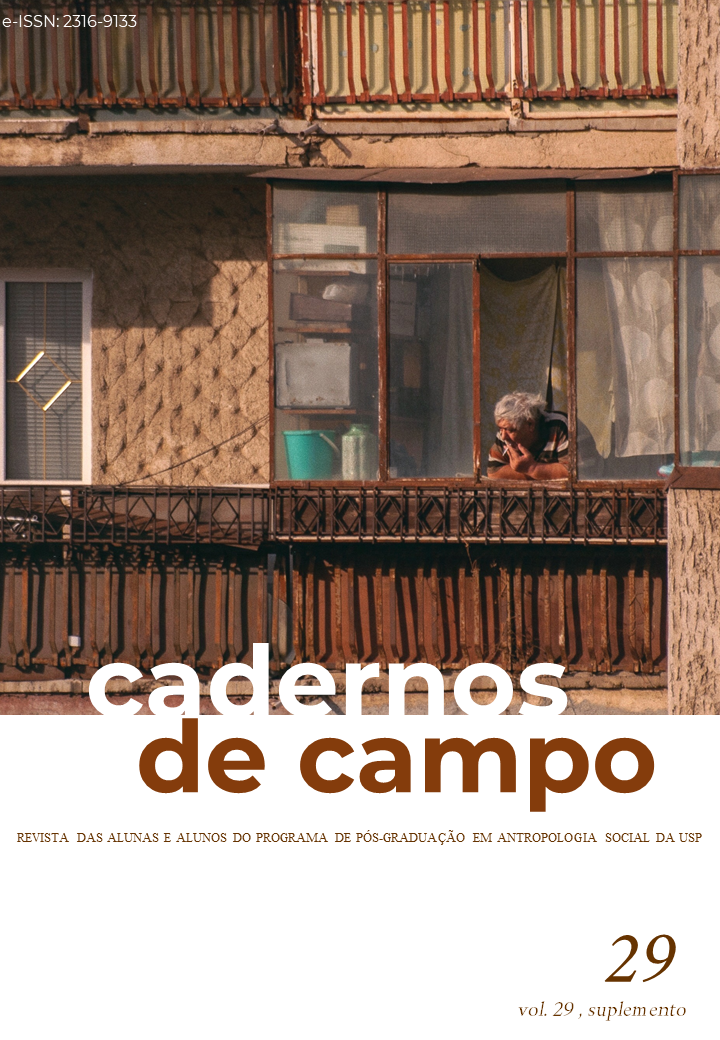Covid-19 and sustainability of life
rethinking state practices from precarity
DOI:
https://doi.org/10.11606/issn.2316-9133.v29isuplp144-152Keywords:
Precarity, Relational work, Interdependence, StateAbstract
Ethnographic research prior to Covid-19 show that the work toward social inclusion of young people and the strengthening of families in the upbringing and care of their children through social programs is part of interdependence relationships, in those that community leaders mobilize key interpersonal, moral and affective commitments for the concretion of the programmatic objectives, even in ways in which these are reconfigured. In the current juncture, in which the pandemic has reinforced historical inequalities in Argentina and has made life in the poor neighborhoods even more precarious, the relational work carried out by those leaders in the construction of the common and the sustainability of life surfaces as evident. In order to analytically illuminate what is exposed in this context of crisis, the proposal is to engage in dialogue the anthropological literature on the State and social policies with the discussions around the category of precarity and social reproduction of life. Indicating that this dialogue will only be fruitful if it centrally incorporates the category of care in the terms in which critical feminism has defined it.
Downloads
References
ABÉLÈS, Marc y JEUDY, Henri-Pierre (Dir.) 1997. Anthropologie du politique. París: Armand Colin.
CAFFENTZIS, George y FEDERICI, Silvia. 2015. Comunes contra y más allá del capitalismo. En: El Apunte. Revista de Estudios Comunitarios 1, p. 51-72.
CARRASCO, Cristina. 2001. La sostenibilidad de la vida humana: un asunto de mujeres? En: Revista Mientras Tanto, n. 82, otoño-invierno 2001, Barcelona: Icaria.
DAS, Veena. 2012. Ordinary Ethics: The Perils and Pleasures of Everyday Life. En: FASSIN, Didier (ed.) Companion to Moral Anthropology. New York: Wiley-Blackwell, pp. 133-149
DAS Veena y POOLE, Deborah. 2008. El estado y sus márgenes: Etnografías comparadas. En: Cuadernos de Antropología Social, n. 27, p. 19-52.
ELIAS, Norberto. 2016. El proceso de la civilización: Investigaciones sociogenéticas y psicogenéticas - México: FCE.
FERGUSON, James & GUPTA, Akhil. 2002. Spatializing states: toward an ethnography of neoliberal governmentality. En: American ethnologist, 29(4), p. 981-1002.
FERNÁNDEZ ÁLVAREZ, María Inés; PACÍFICO, Florencia; y SEÑORANS, Dolores. 2020. Parar la olla durante la pandemia. En: Revista Anfibia. http://revistaanfibia.com/ensayo/parar-la-olla-durante-la-pandemia/
FRANCO PATIÑO, Sandra y LLOBET, Valeria. 2019. Los Centros de Desarrollo Infantil y los procesos de institucionalización del cuidado de la infancia en la provincia de Buenos Aires. En: RODRÍGUEZ GUSTÁ, Ana Laura (Ed.). Marchas y contramarchas en las políticas locales de género: dinámicas territoriales y ciudadanía de las mujeres en América Latina. CABA: CLACSO.
HAN, Clara. 2011. Life in Debt: Times of Care and Violence in Neoliberal Chile. Berkeley: University of California Press.
LIPSKY, Michael. 1983. Street-level bureaucracy: dilemmas of the individual in public services. New York: Russell Sage Foundation.
LLOBET, Valeria. 2013. La reinterpretación de los derechos sociales en las nuevas políticas sociales: algunas reflexiones sobre el universalismo en tres casos de políticas sociales para adolescentes. E: ARZATE SALGADO, Jorge y GLUZ, Nora (Coord.) Del universalismo liberal a “los particularismos” neoliberales: debates para una reconstrucción de lo público en educación. Buenos Aires, Prometeo/UNGS.
LOREY, Isabell. 2016. Estado de inseguridad. Gobernar la precariedad. Madrid: Traficante de Sueños.
MILLAR, Kathleen. 2014. The Precarious Present: Wageless Labor and Disrupted Life in Rio de Janeiro, Brazil”. En: Cultural Anthropology, Vol. 29, No 1, pp. 32–53. Neilson, Brett y Rossiter, Ned. 2008. Precarity as a political concept, or, Fordism as exception. En: Theory, Culture & Society, Vol. 25, No 7-8, pp. 51-72.
NAROTZKY, Susana y BESNIER, Niko. 2014. Crisis, value, and hope: rethinking the economy. En: Current Anthropology 55 (S9): 4–16.
PERELMITER, Luisina. 2011. Saber asistir: técnica, política y sentimientos en la asistencia estatal. Argentina (2003-2008). En: MORRESI, Sergio y VOMMARO, Gabriel (Comp). Saber lo que se hace. Expertos y política en la Argentina. Buenos Aires: Prometeo.
ROSEBERRY, William. 2002. Hegemonía y lenguaje contencioso. En JOSEPH, Gilbert y NUGENT, Daniel (Eds.). Aspectos cotidianos de la formación del Estado. La revolución y la negociación del mundo en el México moderno. México: ERA.
ROSEN, Rachel. 2019. Care as Ethics, Care as Labour. En: LANGFORD, Rachel. Theorizing Feminist Ethics of Care in Early Childhood Practice. Gran Bretaña: Bloomsbury Publishing.
SHARMA, Aradhana y GUPTA, Akhil. 2006. Anthropology of the State. A Reader. Gran Bretaña: Blackwell Publishing.
ZELIZER, Viviana. 2009. La negociación de la intimidad. Buenos Aires: Fondo de Cultura Económica.
Downloads
Published
Issue
Section
License
I authorize Cadernos de Campo Journal of Anthropology to publish the work of my authorship/responsibility, as well as I take responsibility for the use of images, if accepted for publication.
I agree with this statement as an absolute expression of truth. On my behalf and on behalf of eventual co-authors I also take full responsibility for the material presented.
I attest to the unpublished nature of the work submitted





